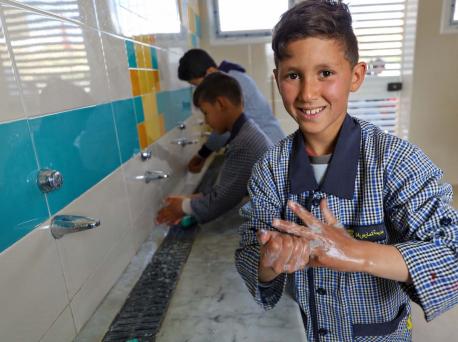
UNICEF WASH Improvements Help Kids Stay Healthy at School in Tunisia
UNICEF and partners are renovating school WASH facilities in Tunisia to increase attendance and improve learning outcomes.
In the small, quiet Tunisian town of Zaouaouine, some 25 miles north of the capital, Tunis, a brisk wind swirls around the outer gates of the local elementary school. From the gate, one can hear the shouts of excited children in the classrooms, which are arranged in a horseshoe shape around a courtyard. The Zaouaouine Primary School dates back to the French colonial period of the early 20th century, and the school building’s brittle age is showing.
Yet next to the classrooms is a freshly built white structure brightly adorned with paintings of kids, teachers and motivational slogans in Arabic. It’s a WASH (Water, Sanitation and Hygiene) sanitary block built by UNICEF and the Ministry of Education with the generous support of the European Union, the European Investment Bank, the Government of Italy and others.
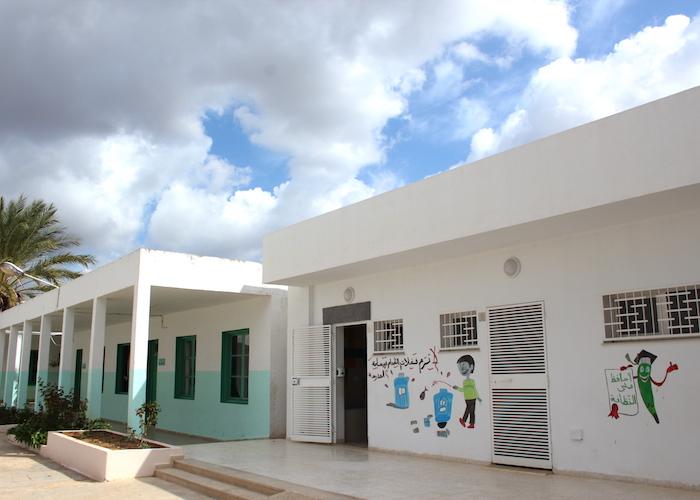
The Zaouaouine Primary School in Tunisia has a new sanitary block, constructed with support from UNICEF. © Sam Kimball for UNICEF USA
WASH infrastructure helps keep children healthy
The block is made up of two adjoining square structures that contain toilet stalls and multiple handwashing stations. It’s well-lit and well-ventilated, with the highest quality materials. WASH infrastructure is critical to keeping children healthy, creating a comfortable and positive learning environment, and keeping them in school.
Tunisia was once a leader in education in North Africa, investing massive amounts of GDP into schools after its independence from France in 1956. But in recent years, schools — particularly those in disadvantaged areas of the country — have suffered from a lack of upkeep and attention, hurting education for children throughout Tunisia. Now, approximately 100,000 students are dropping out of school each year. And WASH infrastructure in schools is one key to making education sustainable.
But UNICEF and Tunisia’s Ministry of Education are determined to bring back strong education in the country. So together, they have launched a fundraising campaign aimed at the country’s diaspora population to collect funds to renovate schools like those in Zaouaouine, to build back education and a better future for Tunisia's children.
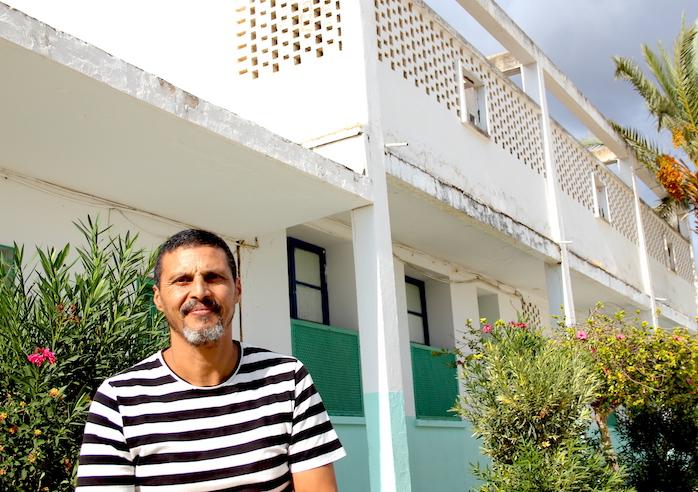
Elyes Abdennabi, a science and social studies teacher at the Zaouaouine Primary School in Tunisia. © Sam Kimball for UNICEF USA
Hygiene trainings promote best practices
Elyes Abdennabi, a science and social studies teacher at the Zaouaouine Primary School, described how the sanitary block at the school used to be.
Speaking inside an office just off the school’s main courtyard, he said, “It used to overflow. The toilets were breaking down and about to fall ... It wasn’t fit for use for humans. It was that bad.” But, he added, "When the Italian Agency for Development and UNICEF and Islamic Relief Association, under the supervision of the Ministry of Education, came along, they turned the old sanitary block into storage spaces for school supplies and sports equipment. Then they built a new sanitary block.”
It's not only the facilities that UNICEF’s WASH in schools program seeks to improve — it’s also knowledge of WASH best practices they are working to spread.
“UNICEF and Islamic Relief gave us a training that covered everything about cleanliness and students’ health. There was even a special training on girls’ hygiene,” Abdennabi remarked.
He noted that other subjects, like waterborne diseases, how to do water quality tests, communication with students on hygiene, and first aid for students were also covered in the training.
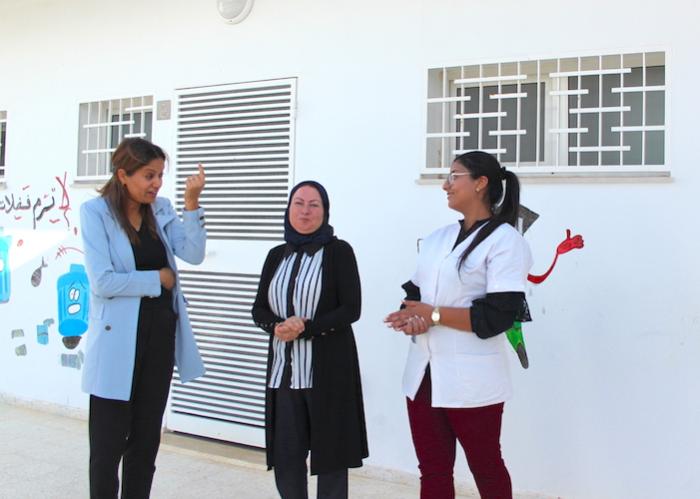
Chayma Zioudi, 24, left, with fellow teachers outside Zouaouine Primary School. © Sam Kimball for UNICEF USA
Clean, well-maintained bathrooms improve students' academic lives
Chayma Zioudi, 24, is one of the newer faculty members at Zouaouine Primary School. But she knows the difference a good sanitary block makes in learning.
“When I was a child at [another] school, I remember the bathrooms there as catastrophic. When we had to go to the toilet to get relief, we couldn’t because it was so dirty. So, either we held it in, or used the toilets and faced possible infections,” she said grimly.
But with the new sanitary block at the school, Zioudi says, the improvement in the children’s academic lives is palpable. “Now when my students go to the toilet, they come back looking glad. It’s like the toilets are a relaxing place for them now!” she said with a laugh.
When asked about the Global Giving Platform and its importance for schools like hers, Anissa Amara, who teaches science, was elated.
“God bless UNICEF,” she said, “for paying so much attention to schools in areas with tough circumstances like ours, and for working to raise money to improve the schools. I’m one of those people who sees what UNICEF is doing for little kids and asks, ‘How can I participate?’”
Students wash their hands in the new UNICEF-sponsored sanitary block at Talha Elementary School in Gabès, Tunisia. © Giacomo Pirozzi for UNICEF
Renovating WASH infrastructure helps reduce school dropout rates
Back in Tunis, Nizar Terzi, Chief of Staff at the Ministry of Education, described the predicament facing certain Tunisian schools, and the solutions that the Ministry is supporting. “Schools in marginalized regions are often lacking good roads, transportation and stable access to potable water.”
This is where supporting WASH comes in. “Building WASH infrastructure is a battle against school dropout rates. When there are no clean sanitary blocks and bathrooms, students stop coming to school, particularly girls,” Terzi says.
Terzi went on to talk about the collaboration with UNICEF Tunisia on the Global Giving Platform. He said that in 2020, many Tunisians living abroad — who make up nearly 10 percent of the Tunisian population — contacted the government saying they wanted to help Tunisian kids get back to school, but they didn’t know how.
So the Ministry met with UNICEF and made an agreement for what became the Global Giving Platform, which they launched together in July 2022.
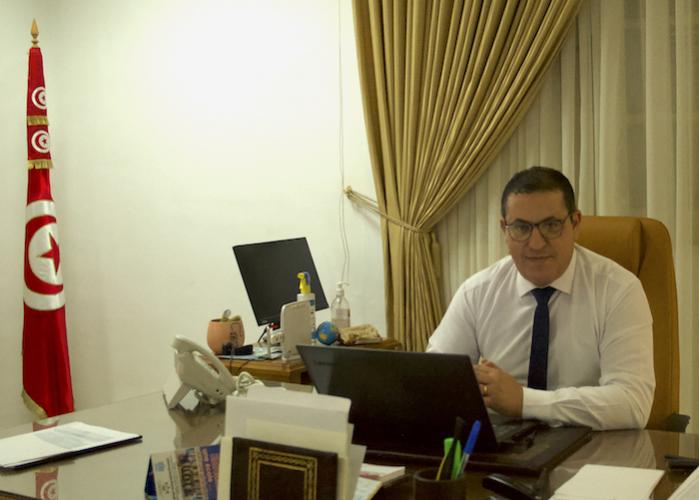
Nizar Terzi, Chief of Staff at Tunisia's Ministry of Education. © Sam Kimball for UNICEF USA
Investment in public education is key to Tunisia's future
“We asked Tunisian ambassadors to get in contact with the diaspora there, make them aware of the GGP," said Terzi, "and make a minimum donation of at least 20 [US] dollars, and to gather Tunisians’ remarks and suggestions for the initiative.”
Terzi added that the GGP has involved internationally known Tunisian influencers, like tennis champion Ons Jabeur and renowned actor Dhafer Labedine, to support the GGP message.
Indeed, Labedine said in a video statement, “Public education in Tunisia formed generation upon generation that helped build Tunisia. But in recent years public education has found itself in a really tough situation. It’s time that we work together to help Tunisian public education and schools, because this will guarantee the future of our children and of future generations."
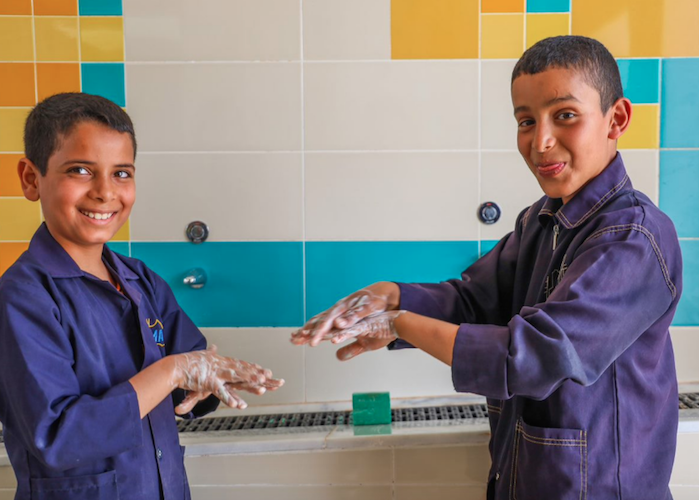
Children wash up in the new sanitary block at Talha Elementary School in Gabès, Tunisia. © Giacomo Pirozzi for UNICEF
Additional years of schooling correlate with GDP growth
Silvia Chiarucci, Deputy Representative of UNICEF in Tunisia, described the vision of the Global Giving Platform, noting that it has been a group effort with funders from around the world.
“The GGP campaign is trying to raise awareness about the challenges and help address some of the most urgent needs. The international community is supporting the Ministry of Education in addressing these infrastructure needs, through programs supported by the European Union, the European Investment Bank, the Government of Italy and others,” Chiarucci wrote in an email to UNICEF USA.
Touching on the importance of water, sanitation and hygiene to schools, and how pressing this particular issue is in Tunisia, she noted that around 10 percent of schools are not connected to an improved drinking water source and 29 percent of schools do not have separated toilets for boys and girls. Over 100 schools are not connected to drinking water at all. She said that only 29.6 percent of children in rural areas and 24.2 percent of children from the poorest households complete the second cycle of secondary education.
Improving the WASH situation in schools, Chiarucci said, improves education overall: “Each additional year of average schooling in a country increases the average 40-year growth rate in GDP by about 0.37 percentage points. Investment in education is key for the future of Tunisia."
UNICEF won't stop working to improve the lives and futures of children around the world. Please donate.


